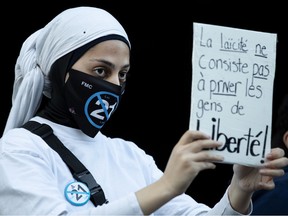The political response to the alarming situation at Bedford elementary school misses the point.

Secularism is so sacred in Quebec, it’s practically dogma.
This aversion to religion and the commitment to civic neutrality is understandable given Quebec’s long history of domination by the Catholic Church.
Many Quebecers alive today still remember when parish priests influenced how many children families had, the clergy was in charge of education and orders of nuns provided nursing care.
Turning away from the church during the Quiet Revolution of the 1960s helped usher Quebec into the modern era. It also created a society that values equality and women’s rights. Knowing this is essential to comprehending what makes Quebec tick socially and politically today.
This history explains — but does not excuse — Quebec’s secularism law, which prevents civil servants in positions of authority from wearing religious insignia, like hijabs, kippahs and turbans. The courts have ruled Bill 21 is discriminatory, especially to Muslim women, but declined to strike it down because it’s shielded by the notwithstanding clause. Although many see the law as state-sanctioned intolerance, it has always been very popular, especially among pure laine Quebecers who grew up under the thumb of the Catholic Church.
An investigative report by the Education Ministry found a faction of teachers, some of them allied with a local mosque, created a toxic climate at the Montreal public school for the past eight years. Among the examples of troubling behaviour: some of these instructors avoided subjects like science and sex ed, tried to dissuade girls from playing sports like soccer, didn’t believe in diagnoses of autism, treated students with learning difficulties as lazy, barred pedagogical experts from their classrooms (including one case in which a male instructor refused to work with a professional who was a woman), slammed rulers on desks and periodically engaged in religious rituals such as prayer or ablutions. It’s like an ardent secularist’s worst nightmare.
Since the report became public this month, 11 teachers have been suspended and may be stripped of their credentials. Substitutes and special monitors have been dispatched to take charge. These actions were necessary to protect children at the school and restore a healthy environment there.
Essentially, the revelations about Bedford have reignited another secularism debate, as political parties scramble to further batten down the hatches of Quebec institutions against the influence of religion.
But this response to the alarming situation at Bedford misses the point.
The problems at the school predate Bill 21. And they persisted after its adoption because of a complete abdication of responsibility by the Centre de services scolaire de Montréal. The school board-turned-service centre failed to confront red flags raised by other teachers at Bedford — some of them also of Maghreb origin, like those in the dominant cabal — dating as far back as 2016. A few rogue actors, who were never properly dealt with, were simply allowed to do what they pleased at the school.
Why the CSSDM would attempt to sweep this mess under the rug is perplexing. Was it out of political correctness? Did it fear a showdown with the teachers’ union, which has a tendency to defend even the indefensible? Was it afraid it would be accused of racism or Islamophobia? Was it stymied by the shortage of teachers? Was it inertia? Incompetence? All of the above?
The bottom line is: The CSSDM had the grounds to act much earlier, and chose not to do so.
This failure of administrative oversight and accountability is now morphing into the latest front in Quebec’s culture wars. However, to say the secularism law needs to be strengthened to make sure this never happens again is misguided. Bill 21 was never applied in the Bedford case — nor was any other rule or regulation, let alone common sense.
The problem with the secularism law in the first place was that it presumes people of faith can’t put aside their religious convictions in the name of professionalism based on what they’re wearing, rather than judging their ability to fulfil their duties in a secular society based on their deeds. Lot of good that did at Bedford.
For opposition parties to team up to propose cutting public funding to all private religious schools is also throwing the baby out with the bathwater. It’s one thing for parents to choose to send their children to schools of a particular domination, which are also expected to follow the Quebec curriculum. It’s quite another to unwittingly expose kids to discredited disciplinary practices, unscientific teaching methods and potential indoctrination in a public school.
But this is where we’re at in Quebec right now. Instead of focusing on ensuring that school boards and service centres live up to their responsibilities and that there are competent teachers in every classroom, political parties seem more interested in reviving identity politics to one-up each other.
This is the last thing Quebec needs. It was divisive the first time around, drawing a line between “nous” and “les autres,” and trampling individual rights in the name of collective interests. But it could be all the more polarizing at a time when the Muslim community is reporting a rise in Islamophobia and the Jewish community is contending with a surge in antisemitism.
It’s not Bill 21 that needs to be strengthened, but rather oversight and accountability in the education system.